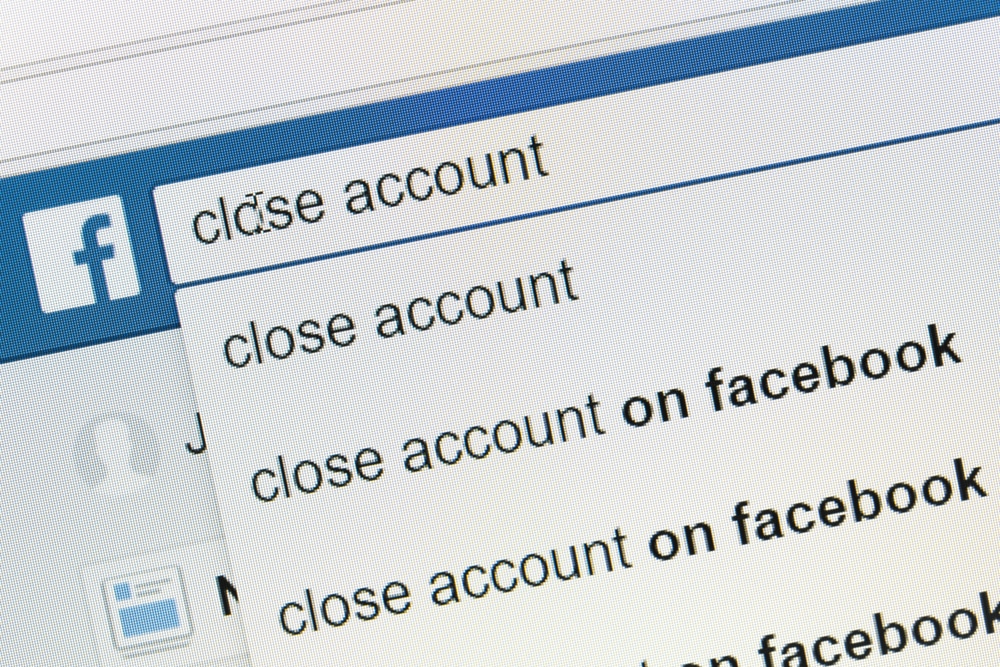How to delete your social media accounts: Benefits, alternatives, and why you should do it

Often, our social media engagements seem like little more than momentary diversions. Someone might scroll through Twitter when sitting in a waiting room or browse Facebook over breakfast. These time commitments feel small in the moment, to the point of being insubstantial -- but over time, these "insubstantial" moments on social media add up. The average person spends almost two hours on social media every day, while the average teenager spends up to nine hours. One study suggests that most people will end up spending more than five years of their lives on sites like YouTube, Facebook, Snapchat, Instagram, and Twitter.
Social media is eating up a lot of your time. While not all of that time is "wasted" -- it’s possible to learn things on social media, network with valuable connections, catch up with friends, and follow important news stories -- five years of your life is a big ask. Have you ever considered deleting your social media accounts? In this article, we’ll explore how to delete your accounts, whether going dark can affect your job prospects, and what you can do instead to limit your social media usage or online exposure.
How to Delete Your Social Media Accounts
Deleting your social media accounts is always an option. For as ingrained as Facebook and Twitter seem in our modern world, they are not mandatory. You might plan to stop or limit your social media use by just logging out and deleting the apps from your phone. If you want the full purge, though, you’ll have to take the plunge and delete your profiles.
This guide will help you understand what the process looks like when you decide to delete your accounts on four of the biggest social sites: Facebook, Twitter, Instagram, and Snapchat.
Facebook gives you two basic options: deactivation or deletion. When you deactivate your account, your profile is no longer searchable or visible. Some of your past Facebook activity -- like messages you’ve sent to other users -- may remain. For the most part, your account will be eliminated -- unless you decide to reactivate it, which you may do at any time.
If you decide to delete your account, it will be entirely gone. Your friends, photos, posts, and other account details will be scrubbed from the web, and you will not have the option to get them back.
There are a few qualifiers here. First, Facebook gives you a grace period after you initiate the deletion process. If you change your mind within the grace period, you can log back into your account to cancel the deletion. Second, your data won’t be entirely gone for a little while longer. It takes about 90 days for Facebook to scrub your information from all its systems and servers -- though this information will still not be viewable on Facebook during that 90 days.
If you wish to delete or deactivate your Facebook account, click here to find out how. If you want to delete your Facebook but don’t wish to lose your photos, posts, and other prior activity, that Facebook makes it easy to download your profile data.
- Twitter
With Twitter, deactivation is the first step toward deletion. Twitter requires any user wishing to delete their account to deactivate it first. Following deactivation, your account, username, profile, and tweets will no longer be visible on Twitter, but they will still exist on the website.
Twitter retains this information for 30 days, during which you can reactivate your account at any point. You can reactivate within these 30 days without losing any prior tweets or data. After the 30 days have elapsed, Twitter will permanently delete your account and all the tweets and information associated with it. Here is a step-by-step tutorial to help you deactivate and delete your Twitter account.
You can download an archive of your Twitter account before you deactivate.
You can temporarily disable your Instagram account or opt to delete it permanently. Instagram hides disabled accounts from view but retains photos and other data. When you delete your account, every trace of your Instagram data -- including photos, videos, comments, and followers -- will disappear. Instagram has a helpful page explaining how to disable your account, delete your account, or download your Instagram data.
- Snapchat
Snapchat’s policy for account deletion is nearly identical to Twitter’s. You must start by deactivating your account. After 30 days of account deactivation, Snapchat will delete the account permanently. If you wish to cancel the deletion, all you need to do to reactivate your account is to log back into Snapchat sometime before the 30 days have elapsed. Sometimes, it can take up to 24 hours to reactivate a deactivated account.
Snapchat notes that it will "retain some personal data for certain legal, security, and business needs." Any purchases made through Snapchat, for instance, will still be on file with the company. Deleting an account will remove almost everything, though, including snaps, chats, stories, and friends. Learn how to delete your account on the Snapchat website. You can also download some of your account data.
Social Media and Your Job Prospects
Some job seekers delete their social media profiles to avoid the brunt of the so-called social media background check. In recent years, more and more companies have started using social media as a means of learning more about candidates. If you have tweets, photos, Facebook posts, or other social media content that you wouldn’t want an employer to see, you may be interested in scrubbing your social media presence, or erasing it, to eradicate those offending pieces of content.
There are pros and cons to this maneuver. On the one hand, employers can’t find what isn’t there. Once you deactivate or delete your social media accounts, employers will not be able to find them on Google or view them in any way. On the other hand, being off the grid can negatively affect your employment options in some cases.
Employers aren’t going to reject you from a job because they couldn’t find you on Facebook. However, you might miss out on job and networking opportunities by not being on a social network like LinkedIn, which most headhunters use to find and connect with potential hires. In addition to accessing Facebook’s job listings, being able to connect with co-workers on social media is a good way to deepen friendships in the workplace -- something that may be harder for you if you aren’t active online.
Striking the Right Balance
Ultimately, you can and should make your own decisions about what to do about social media going forward. Not being active on Facebook or Snapchat won’t entirely preclude you from professional opportunities, friendships, or personal relationships, but it might change the dynamic of those opportunities and relationships from time to time if you miss out on a freshly-posted job opportunity or inadvertently pass on a special event when invites are shared exclusively on social networks.
If it’s privacy you’re after, know that you can implement privacy settings on most social networks that make your profile difficult to find or view for people with whom you aren’t already connected. If unflattering tweets and photos are the problem, you might take a Saturday afternoon to go back through your accounts and delete anything that is objectionable, offensive, unprofessional, or not reflective of who you are anymore.
The most important thing with social media is to strike the right balance. Twitter, Facebook, and other sites can be valuable, but they can also eat up time shockingly quickly. You might consider using social media only on your computer and never on your phone, or even downloading one of these apps to limit or block social media on mobile devices.
At the end of the day, deleting your social media accounts is one way to limit your online exposure and daily time sucks -- not the only one.
Photo Credit: pixinoo / Shutterstock
 Michael Klazema is Chief Marketing Technologist at VODW.com and has over two decades of experience in digital consulting, online product management, and technology innovation. He is the lead author and editor for Dallas-based backgroundchecks.com with a focus on human resource and employment screening developments.
Michael Klazema is Chief Marketing Technologist at VODW.com and has over two decades of experience in digital consulting, online product management, and technology innovation. He is the lead author and editor for Dallas-based backgroundchecks.com with a focus on human resource and employment screening developments.